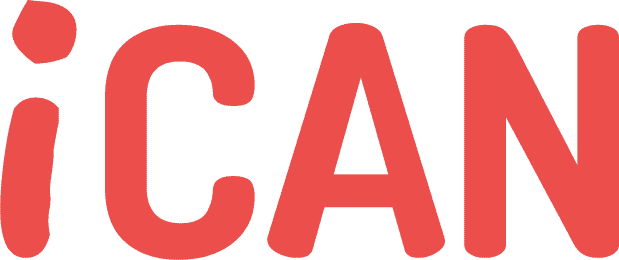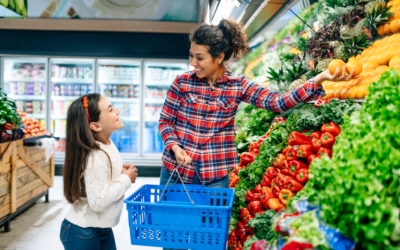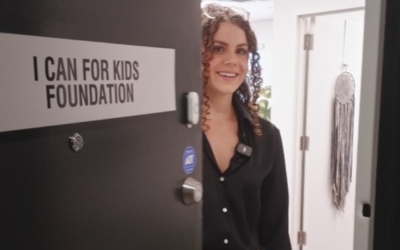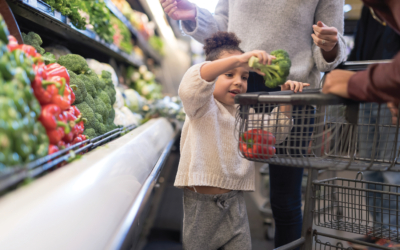Few people recognize how charitable food programs create a completely separate – and inequitable – food system.
The United Nations Universal Declaration of Human Rights advocates for all people to have physical and economic access to enough food that meets their unique biological, cultural, and health requirements. In 2020, I Can for Kids (iCAN) established a year-round grocery gift card program to help maximize the number of low-income children in Calgary whose parents could afford to buy enough healthy food from local grocery stores. Our new approach caught the attention of the University of Calgary who then conducted research with our recipients and our agency partners.
The results validated how our model strengthens a family’s ability to exercise their right to food with choice, dignity, and access to the traditional food system.
Better Food, Less Stress
Few people recognize how charitable food programs require vulnerable households to access a completely separate food system hidden well outside the convenient and reliable network of regular grocery stores. iCAN continually receives messages of emotional relief from food-insecure families who regain control over their diet quality, eating patterns, and shopping routines through access to our grocery gift card program:
- “The ability to choose what our family eats takes away the shame we feel about needing help.”
- “The grocery gift cards make it possible to pick the variety and freshness that we need.”
- “My wife and I can’t tell you the happiness our children felt as we went to buy food they needed that I couldn’t afford with my limited fixed income.”
- “With a grocery gift card, we can go to the store any time. We don’t have to make an appointment to go.”
Families who access our program are grateful that they no longer need to exhaust their energy navigating Calgary’s complex and inconsistent charity options, including food hampers, school meal programs, and discounted food markets. Food provision programs simply cannot maintain a regular and fresh supply of the hundreds of unique products that a large and culturally diverse group of vulnerable families require. However, food-insecure households experience much less anxiety with our grocery gift cards because they feel confident that the specific products they need will always be available to them.
The Right to Food or The Right to Be Fed?
Our society has deeply misinterpreted the United Nations’ definition of the right to food. With the proliferation of food charity over the past 40 years, we’ve unconsciously embraced and systematized an alternative belief in the right to be fed. This fateful misconception has inspired the birth of thousands of nonprofits that invest considerable energy (and money) into collecting, storing, repackaging, and distributing donated food to people who actually need more income to meet their own basic human needs. It’s time to recognize that this alternative food system is far from inclusive, equitable, or dignified.
Charitable food provision programs don’t enhance momentum towards the right to food for all people. While it might feel uplifting to believe that donated food creates a win-win for both the environment and low-income populations, research shows that even the most severely food-insecure households rarely access food programs to address a major life struggle caused by a lack of money. Simply put, food-based responses don’t address inadequate income and they certainly don’t instil a sense of dignity, equality, or autonomy.
Unfortunately, food charity does nurture the illusion that it’s best practice to redistribute, low-quality, low-nutrient, unfamiliar, or leftover products to households facing a whole host of more significant barriers, such as an escalating cost of living, lagging wage rates, unexpected financial shocks, high healthcare costs, and unaffordable housing.
Focus on the Evidence
iCAN continues to advocate for evidence-based approaches to food insecurity and poverty. We realize that our grocery gift card program doesn’t solve the overarching need for effective income policy. Yet we strongly believe that our innovative approach lends support to poverty reduction efforts by demonstrating the powerful impact of modest subsidies. Our goal is to create a bridge that facilitates the journey towards long-term change and solutions.
We all agree that access to healthy food is an essential human right. Our own study confirms that our approach empowers food-insecure kids and families to maintain their right to food with respect, autonomy, and the freedom to shop with the rest of us.
To join iCAN’s expanding list of sponsors and champions, check out the different ways you can get involved or donate.
To learn more about I Can for Kids and their unique approach to childhood food insecurity, visit www.icanforkids.ca
About Donald Barker
Donald Barker has worked as a registered dietitian for more than 25 years. He also has a professional background in communications and has long advocated for populations who face adverse, unjust, or systemic barriers that lead to higher rates of poor social, mental, emotional, and physical health outcomes. Donald currently volunteers as an Advisor with iCAN to support our transition towards evidence-based approaches that help improve the well-being of children in Calgary who live in low-income and food-insecure households.
About I Can for Kids Foundation
I Can for Kids works closely with multiple agency partners to target and distribute grocery gift cards to food-insecure families who are most in need. The iCAN grocery gift card program is a more dignified and inclusive approach to dealing with food insecurity, allowing families to shop where everyone else shops and to choose foods that are appropriate for their health and cultural needs. Explore their website to discover more about iCAN’s impact over the years.
For more information and media inquiries, please contact iCAN Executive Director, Bobbi Turko at bobbi@icanforkids.ca.




